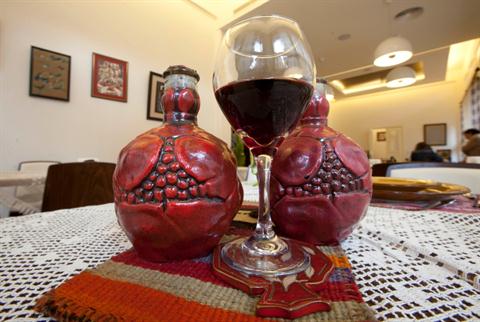
Armenian pomegranate wine is gaining popularity in Beirut’s Armenian suburb of Burj Hammoud and beyond after making a big impression at the Beirut Cooking Festival in November where visitors couldn’t get enough, The Daily Star reports.
Armenia is one of the oldest wine-producing regions in the world, but the pomegranate, with its tight clusters of seeds and vivid color, has special significance in the culture.
“The pomegranate represents family, solidarity, a community that sticks together, and the color symbolizes happiness,” said Arpi Mangassarian.
Mangassarian wears many hats in the local Armenian community as a municipality official and founder of the Badguer Restaurant and HeritageCenter, which is responsible for introducing the wine to the public at the Cooking Festival.
Armenian food has already distinguished itself among the cuisines of the region for its rich palette and playful mix of spicy, sweet and savory flavors, so it’s no surprise that this tart, semisweet wine is just as surprising and delicious.
In the Badguer dining room, pomegranate wine is served alongside hearty, traditional Armenian dishes such as stuffed carrots and kebbeh. The fruit’s symbolic significance is also clearly on display, with pomegranate motifs adorning everything from the curtains to the napkins.
“Its presence makes us feel there is balance and joy and prosperity,” Mangassarian explained.
“They say if you count all the seeds in a pomegranate there are exactly 365, but I never counted!” she added.
Until now, the wine, which is imported from Armenia, is hard to find, even among wine and liquor shops in Burj Hammoud. According to Mangassarian, most Lebanese Armenians acquire a taste for the drink when they visit Armenia.
But according to Elie Maamari, an oenologist and export manager for Ksara, that could soon change as pomegranate wine is enjoying somewhat of a renaissance internationally.
As a wine expert, Maamari says he was taken aback by the sweetness of the drink, which he considers more of a liquor or a dessert wine. “I think it will catch on in Lebanon, but the question is what can you consume it with? Maybe cheese or dessert,” he suggested.
Despite its marketability, Maamari sees little opportunity for the commercial production of pomegranate wine locally, pointing out that Lebanon does not grow enough pomegranates to sustain such an industry. Syria, he added, would have been an ideal place to produce pomegranate wine, if not for the current crisis








